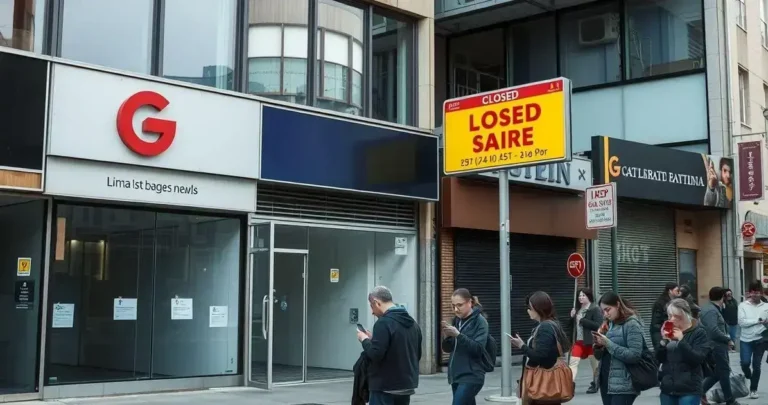Announcements
Signs of a Slowing Economy are becoming more noticeable, and understanding them is key to navigating uncertain times. It’s not always obvious, but subtle shifts in job markets and consumer behavior can signal a downturn. Paying attention to these early indicators can help you stay ahead of the curve.
When large corporations start seeing a dip in their profits, the ripple effects can impact everyone. Job cuts and hiring freezes are often the first signs of a slowing economy. Watching for these signs can give you a better sense of what to expect in the near future.
As consumer spending decreases and people become more cautious, the warning signs grow louder. If you’re noticing these shifts in your daily life, you’re not alone. Keep reading to learn how to prepare for a potential economic slowdown and what steps you can take to protect yourself.
Announcements
Understanding Signs of a Slowing Economy
Understanding the signs of a slowing economy is important for everyone. Many people notice small changes around them, like fewer job opportunities or less shopping in stores. These changes can signal that the economy is not doing as well as it should. When you keep an eye on these signs, you can be better prepared.
Another sign is when large companies start to make less money. If businesses are earning less, they may cut jobs or stop hiring new workers. This can lead to a rise in unemployment, which is a clear sign that the economy is slowing down. Paying attention to news about big companies can help you catch these signs early.
Announcements
Changes in consumer habits also show signs of a slowing economy. When people start saving more money or cutting back on spending, it can mean they’re worried about the future. If you notice that people are less willing to buy things, it might be a signal of trouble ahead, making it even more important to stay aware of these signs.
Key Indicators of Economic Slowdown
When looking for the **key indicators of economic slowdown**, one of the first signs is rising unemployment. When businesses are less confident in the economy, they may start laying people off or freeze hiring. This can lead to more people struggling to find work, which is a clear warning of economic trouble ahead.
Another important indicator is a decline in consumer spending. When families start to cut back on their purchases, it often means they are feeling worried about their finances. This decreased spending can affect businesses and lead to slower growth. Watching how much people are buying can give clues about the economy’s health.
Lastly, a drop in stock market values often indicates a slowing economy. Investors may sell stocks if they feel that companies will not perform well. A declining stock market can make people feel less secure, further reducing spending and investment. Keeping an eye on stock market trends can help you understand how the economy is doing.
The Impact of a Slowing Economy on Businesses

The impact of a slowing economy on businesses can be significant. When the economy slows down, companies often see fewer customers. This drop in demand can lead to lower sales, which means businesses earn less money. As sales decrease, companies may have to make tough choices, like reducing staff or cutting back on expenses.
Another effect of a slowing economy is that access to credit may become more limited. Banks tend to be more cautious during economic downturns, making it harder for businesses to get loans. Without necessary funding, companies might struggle to invest in growth or cover everyday expenses. This can create a cycle that makes the economy weaker over time.
Additionally, a slowing economy can impact employee morale and productivity. Workers may feel uncertain about their jobs, which can lead to lower motivation. Companies may find it harder to keep their best talent, as employees look for more stable opportunities elsewhere. Maintaining a positive work environment becomes essential for businesses during tough times.
How to Prepare for a Slowing Economy
To **prepare for a slowing economy**, it is essential to create a budget. Knowing where your money goes can help you manage your expenses better. Start by tracking your spending and identifying any areas where you can cut back. Making a plan will help you save money and be more ready for any financial challenges ahead.
Another important step is to build an emergency fund. Having extra savings can provide security during tough times. Aim to save enough money to cover three to six months of living expenses. This way, if you face unexpected changes, like losing your job, you will have a safety net to rely on.
Lastly, consider improving your skills or learning new ones. By investing in your education, you can make yourself more valuable in the job market. This can help you stand out and find a job even if the economy slows down. Staying adaptable is key to navigating a changing economic landscape.
Coping Strategies During Economic Downturns
During economic downturns, it is important to have coping strategies in place. One effective strategy is to focus on reducing non-essential expenses. Take a close look at your monthly bills and see where you can save money. This might mean cutting back on dining out or canceling subscriptions you don’t use. By spending less, you can help ease financial stress.
Another useful strategy is to stay connected with your community and support each other. Reach out to friends and family during tough times. Sharing your challenges and ideas can help you find resources and solutions you might not have thought of. Building a support network can provide comfort and advice.
Additionally, maintaining a positive mindset is crucial. It can be easy to feel overwhelmed during an economic downturn, but focusing on the things you can control is important. Set small, achievable goals each day. Whether it’s finding a new hobby or learning something new, staying engaged and proactive can keep your spirits up even when times are tough.







